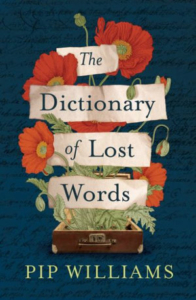THE DICTIONARY OF LOST WORDS | PIP WILLIAMS | 2020
This is a very personal review. My grandfather was an erudite man. He loved whiskey and he loved words. So much so he had a dictionary beside his bed and would learn new words and their meaning every night. Fast forward to my teen years and I found myself doing the same. One of my most treasured possessions and read from cover to cover many times is An ABC of English Usage printed in Oxford at the Clarendon Press in 1936.
The Clarendon Press is where the Oxford English Dictionary (OED) is published, which in Pip William’s book almost becomes a character. The Dictionary of Lost Words is an absolute gem of a book. It starts slowly in 1886 with Esme as a child and for me that is one of its delights; we discover Esme’s lost and found words as pointers to the ensuing story line. As she grows into a teen and adult it gathers pace; we all know that the years go faster and events come and go more swiftly as we age.
Esme is devoted to words. Her father is a lexicographer and works on compiling the OED with the other characters, many who are taken from real life. Their job is to consider words and their meanings and to discard those that cannot be found in a quotable source of the written word. Colloquialisms are not given a place, nor are the slang words women often use to describe their state of being. Esme collects all of these and hides them in a wooden trunk.
This book is set in the era of the escalating women’s suffragist movement, and tackles topics such as the nature of women’s work, unwed mothers and adoption, death of loved ones and the horrors of World War 1.
Some of the writing is sublime, some of the characterisations are moving and overall it’s a great read. My criticisms are few: the first half is slow; the protagonist Esme is often somewhat removed from the action and her feelings are not always well articulated. At times I felt that if something awful happened to her it was described in a detached way as if she was viewing it not suffering it. At the end I felt that I knew of her but not her. Having said all that, for the words and their meanings woven around a great storyline it’s a joy to read.
My grandfather would have loved it too!

